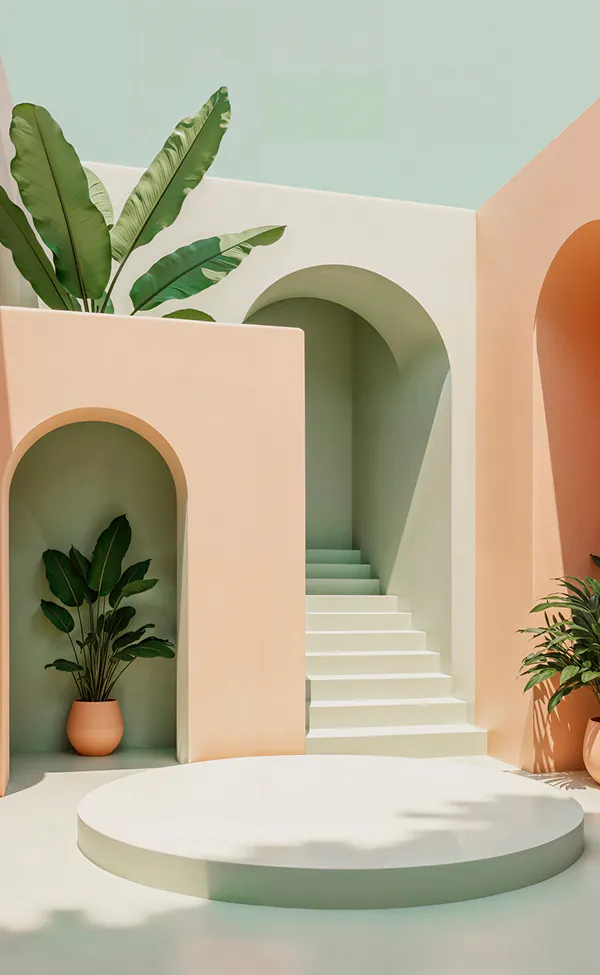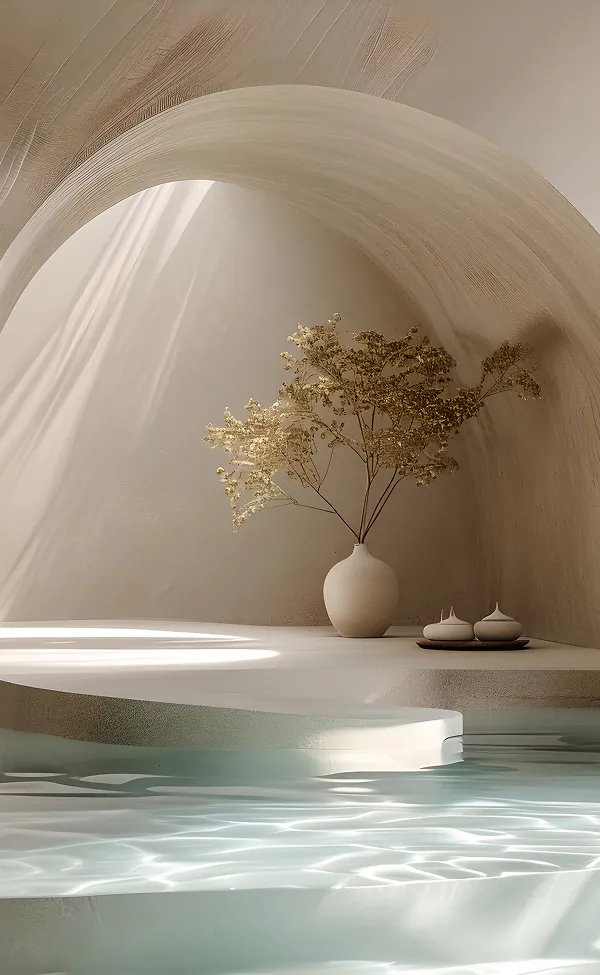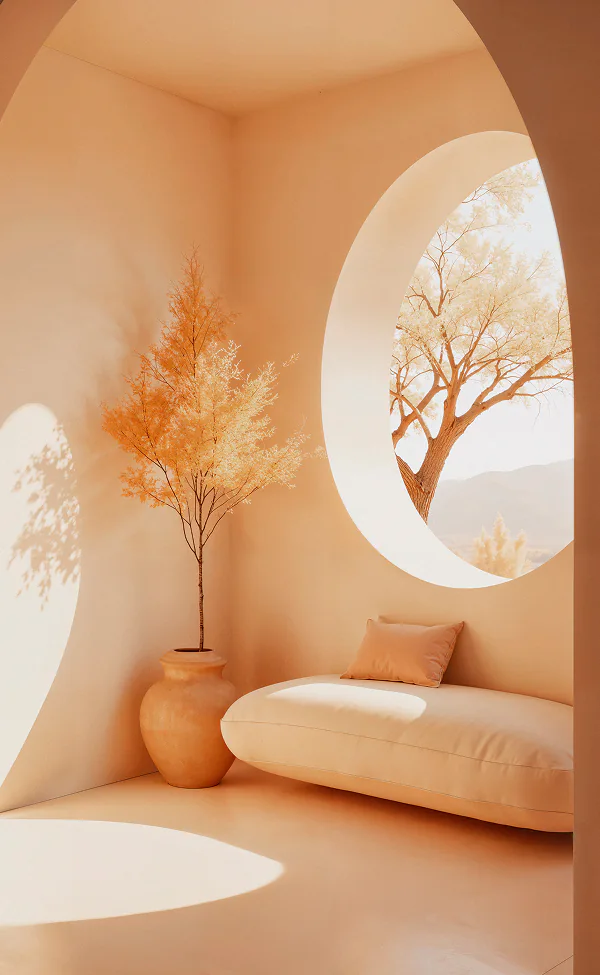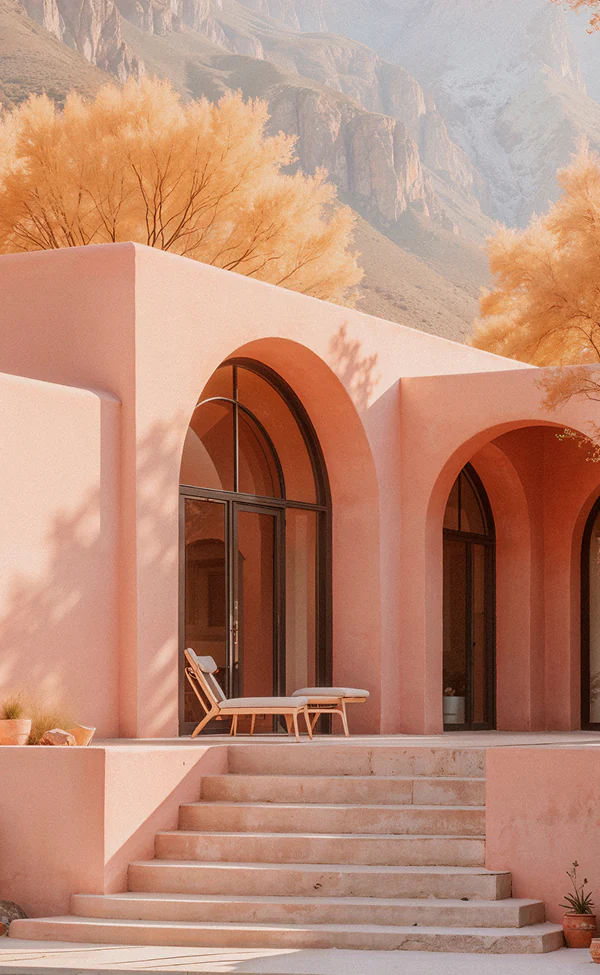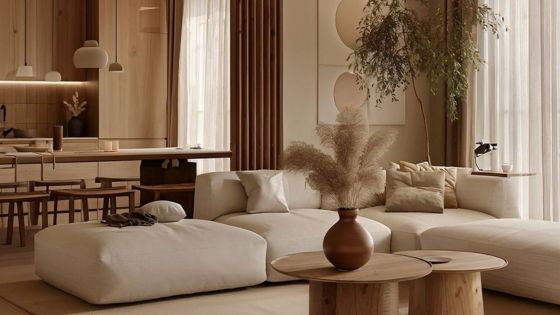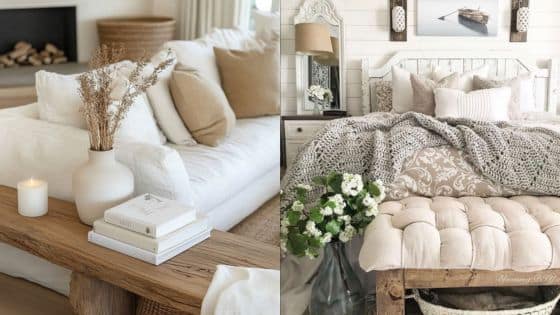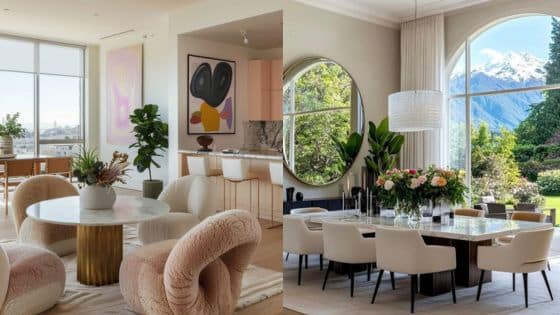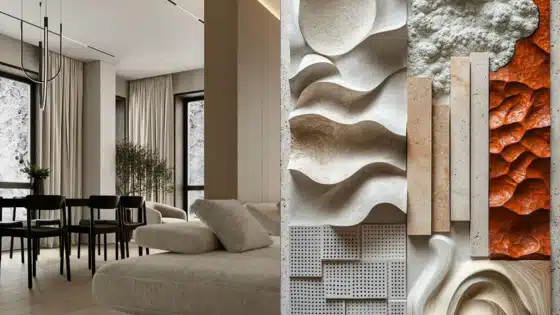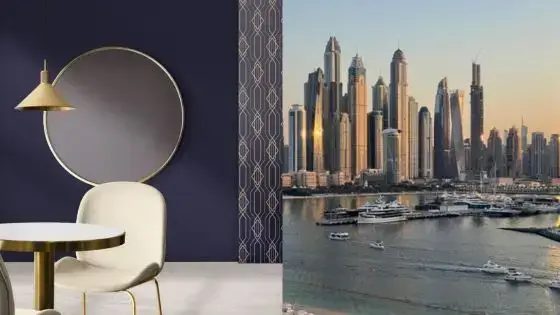The living room. It’s often the heart of our homes, the place where we unwind after a long day, host friends for casual get-togethers, and create lasting memories with family. While the big-ticket items like sofas and armchairs set the foundation, it’s the smaller, more adaptable pieces – the living room accent furniture – that truly elevate a space from merely functional to effortlessly stylish and deeply personal. These aren’t just filler items; they’re the design heroes that bring personality, add pops of texture and color, and inject a sense of lived-in comfort that makes a house feel like a home.
Forget stiff, formal arrangements. Today’s homes embrace a more relaxed, authentic vibe, and accent furniture is key to achieving that casual elegance. It’s about creating spaces that are inviting, practical, and reflect your unique style without feeling overly curated or unapproachable. Let’s dive into how these versatile pieces can transform your living room into a haven of laid-back sophistication.
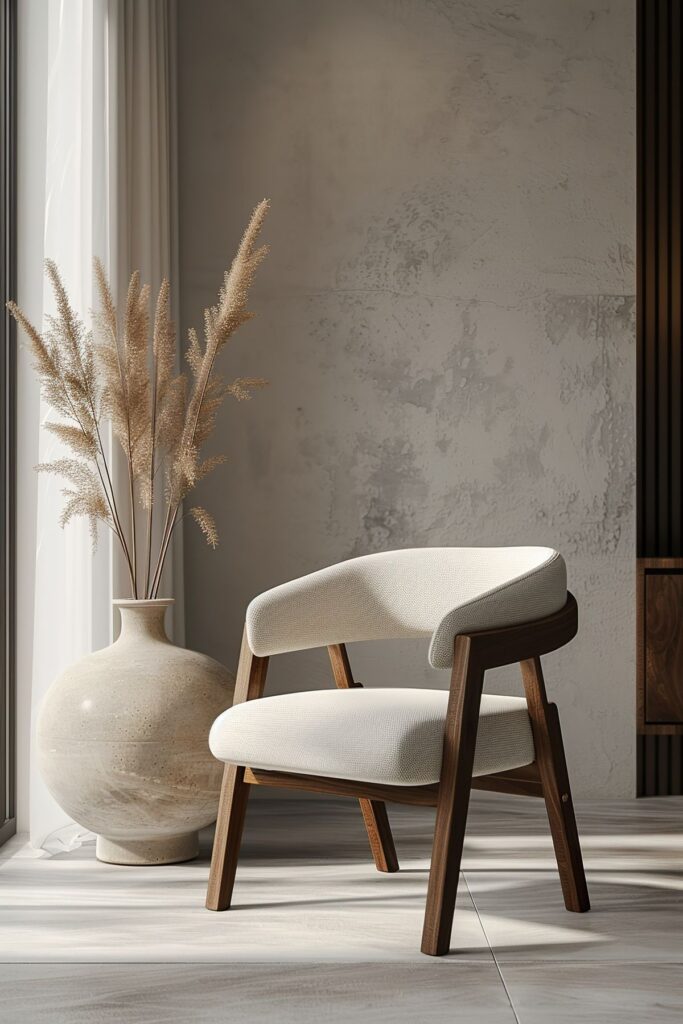
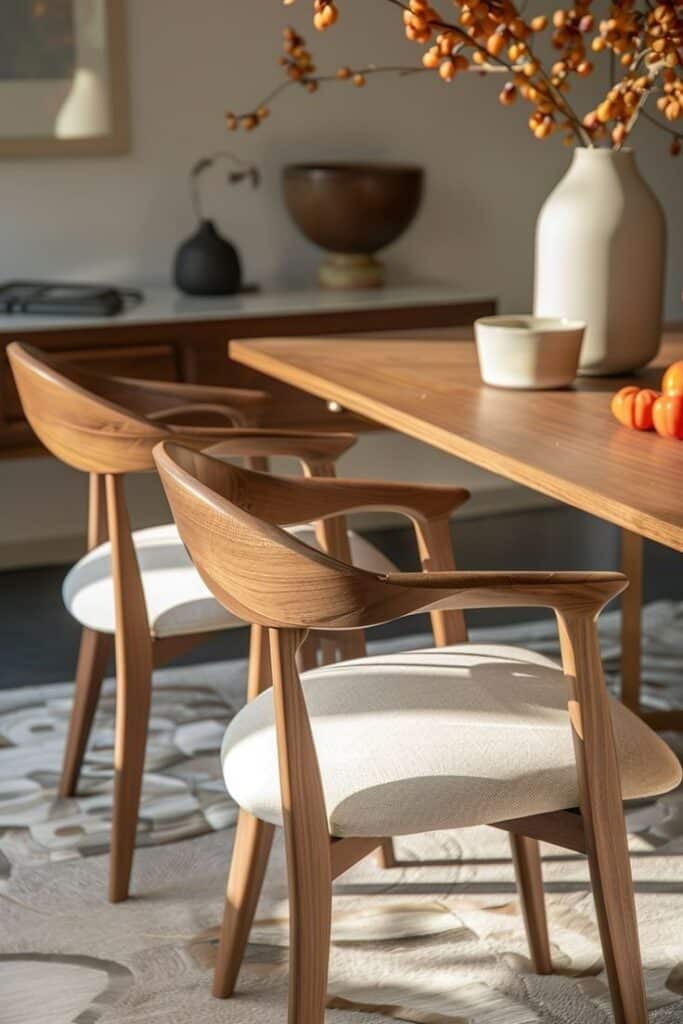
Defining “Casual” in Living Room Design
Before we delve into specific pieces, let’s nail down what “casual” truly means in the context of living room design. It’s more than just throwing a blanket over a sofa; it’s a philosophy. A casual living room prioritizes comfort, livability, and a relaxed atmosphere over strict symmetry or formal grandeur. Think of a space where you can genuinely kick back, put your feet up, and feel completely at ease.
Key characteristics often include:
- Approachability: Furniture pieces that invite you to sit, lounge, and interact. No “for show only” items.
- Softness and Texture: Natural fabrics like linen, cotton, and wool, often layered. Textural elements like chunky knits, woven baskets, and natural wood.
- Warm Color Palettes: Often built on neutrals (creams, grays, whites) with earthy tones, soft blues, and muted greens. Pops of brighter color are used sparingly and thoughtfully.
- Functional Versatility: Pieces that serve multiple purposes – an ottoman that’s a footrest, extra seat, and coffee table.
- Organic Shapes and Lines: Less rigid, more fluid forms. Rounded edges, comfortable curves, and less emphasis on sharp angles.
- Personal Touches: A collection of books, family photos, unique art pieces, and souvenirs that tell a story. This is where your personality shines through, making the space uniquely yours and adding to the overall feeling of modern living. For more on this, explore What Modern Living Looks Like in Everyday Homes.
- Understated Elegance: It’s not about being messy, but about being comfortable and relaxed without sacrificing style. It’s an effortless kind of chic.
Why choose casual? Because our lives are often anything but formal. We crave spaces that offer a retreat, a place to decompress, and a comfortable backdrop for our everyday lives. Casual design embraces this reality, creating rooms that feel genuinely lived-in and loved.
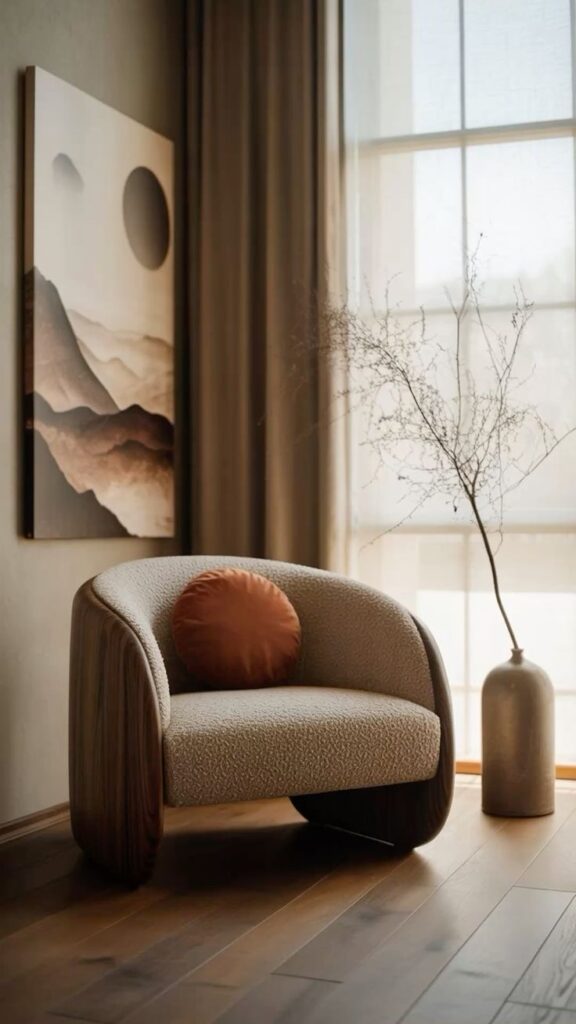
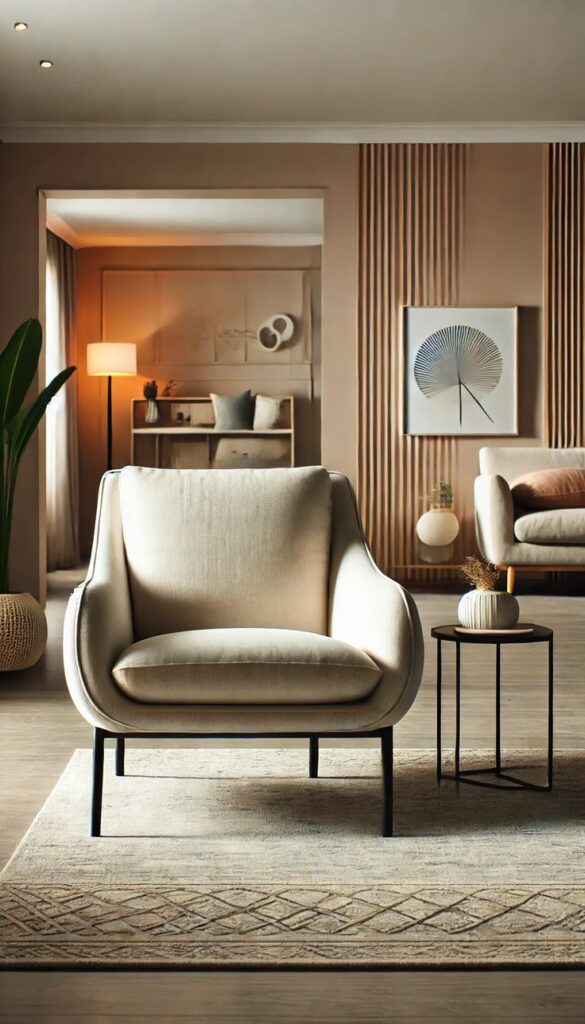
The Unsung Heroes: Why Accent Furniture Matters
Beyond the foundational sofa and media console, accent furniture plays a crucial, often underestimated, role in shaping your living room’s aesthetic and functionality. These pieces are the supporting cast, the details that transform a good room into a great one. They’re not just about filling empty space; they’re about adding layers, purpose, and visual intrigue.
Here’s why these unsung heroes are indispensable:
- Injecting Personality: Main furniture often dictates a general style, but accent pieces are where your unique taste truly comes alive. A quirky side table, a vintage accent chair, or a colorful pouf can tell a story and make the space feel uniquely yours.
- Adding Functionality: Need a spot for your drink, a place to rest your feet, or extra storage? Accent furniture steps up. They solve practical problems while looking good doing it.
- Breaking Up Monotony: A large sofa can sometimes feel imposing. Strategically placed accent chairs, side tables, or even a console behind it can break up the visual weight and add interest.
- Defining Zones: In open-concept living rooms, accent furniture can subtly delineate different areas – a reading nook with an accent chair and lamp, or a conversation area centered around a coffee table.
- Introducing Texture and Color: They provide an opportunity to bring in different materials, patterns, and colors without committing to a large, expensive piece. This is crucial for adding depth and warmth to a casual space.
- Versatility and Flexibility: Many accent pieces are lightweight and easily movable, allowing you to reconfigure your space for different occasions or simply to refresh the look when inspiration strikes.
Think of it this way: your main furniture is the canvas, and your accent furniture is the brushstrokes that add detail, depth, and character to the masterpiece.
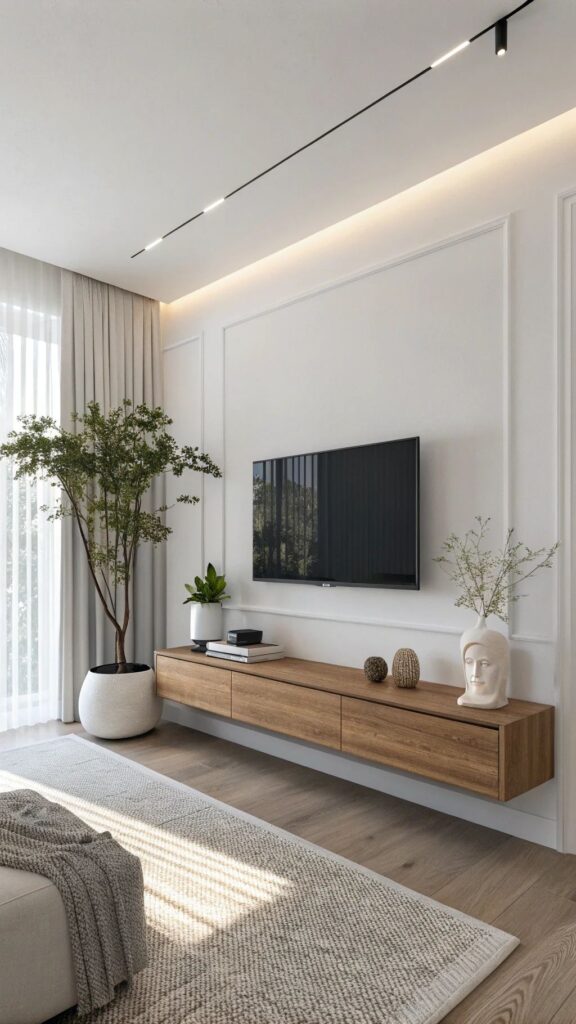
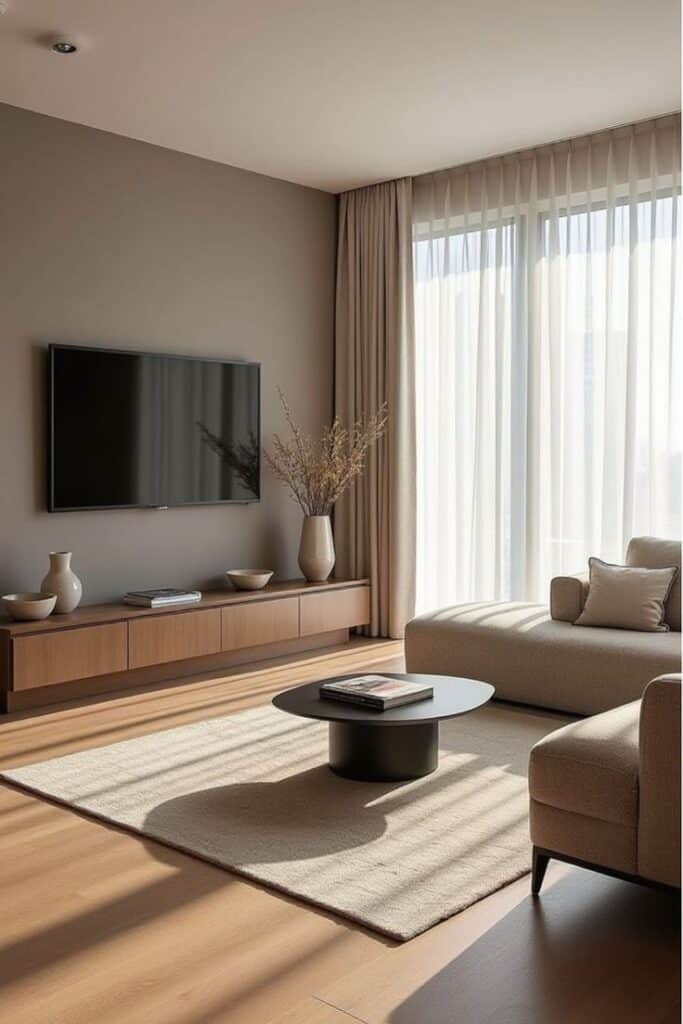
Top Casual Living Room Accent Furniture Pieces
Now, let’s explore some of the most beloved and effective types of casual living room accent furniture that can bring effortless style to your space.
Side Tables & End Tables
These small but mighty pieces are essential workhorses in any living room. In a casual setting, they’re not just for holding lamps; they’re the convenient landing spots for coffee mugs, remote controls, books, or a small plant.
- Function: Provide convenient surfaces, anchor seating arrangements, add decorative flair.
- Casual Styles: Look for pieces with natural wood finishes (light oak, reclaimed wood), woven textures like rattan or wicker, simple metal frames, or even ceramic garden stools. Nesting tables are fantastic for casual versatility, allowing you to pull out extra surface area when needed.
- Tips: Mix and match different styles or heights for an eclectic, relaxed look. A chunky log-style table next to a sleek metal one can work beautifully.
Coffee Tables
The coffee table is often the focal point of a casual living room’s seating area. It needs to be functional but also contribute to the relaxed vibe.
- Function: Central surface for drinks, decor, books, and often a place to put your feet up.
- Casual Styles:
Large Ottomans: Upholstered ottomans are perfect for casual comfort, serving as a soft surface for feet or trays for drinks. Leather, linen, or boucle fabrics are excellent choices. Nesting Tables: Again, great for flexibility. Arrange them together or pull them apart for individual use. Reclaimed Wood or Live-Edge Tables: These bring a natural, organic feel. Round or Irregular Shapes: Soften the room’s lines compared to sharp rectangular tables. Woven or Rattan Tables:* Excellent for a beachy, bohemian, or relaxed natural aesthetic.
- Tips: Choose a size and height that is proportionate to your sofa. Ensure there’s enough space around it for comfortable movement. Don’t be afraid to accessorize with a few well-chosen items like books, a decorative tray, or a small plant.
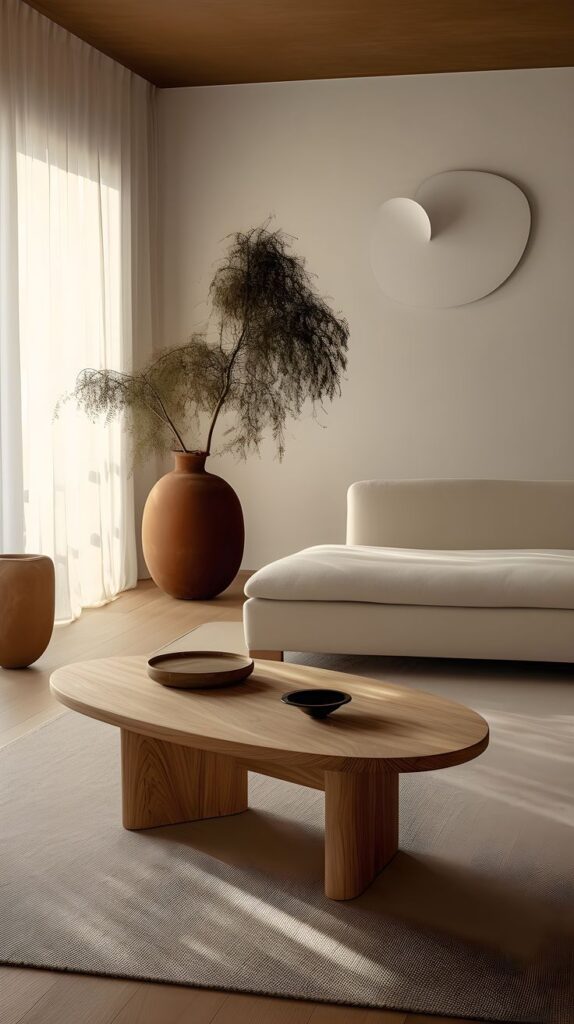
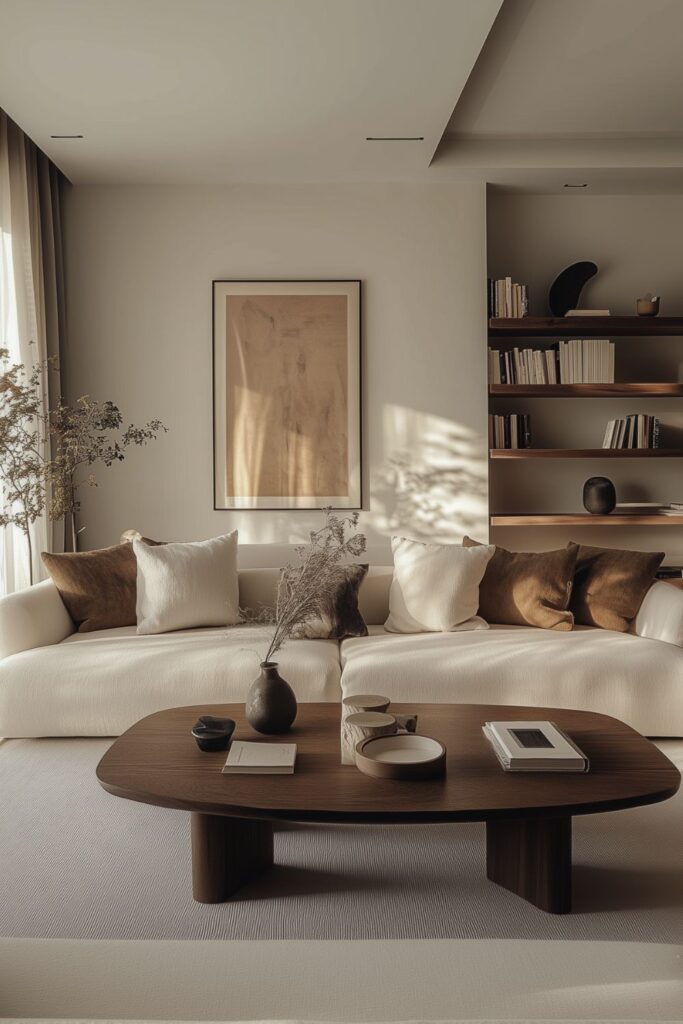
Accent Chairs
An accent chair is more than just extra seating; it’s an opportunity to introduce a different silhouette, color, or texture, creating a cozy nook or a statement piece.
- Function: Provides additional seating, creates a visual anchor, defines smaller zones within the room.
- Casual Styles:
Papasan or Rattan Chairs: Evoke a laid-back, bohemian feel. Upholstered Armchairs: Look for inviting fabrics like linen, velvet, or boucle. Comfortable, deep seating is key. Mid-Century Modern Inspired Chairs: Often have clean lines and comfortable forms, fitting well into a casual modern aesthetic. Wingback Chairs (Modern Twist): A classic form given a casual update with softer fabrics or a more relaxed silhouette. Chairs with Exposed Wood Frames:* Add warmth and a handcrafted feel.
- Tips: Place an accent chair next to a window for a reading nook, or opposite your main sofa to complete a conversation area. Pair it with a small side table and a floor lamp for a complete vignette. Remember, you can even redesign old furniture to create unique accent chairs.
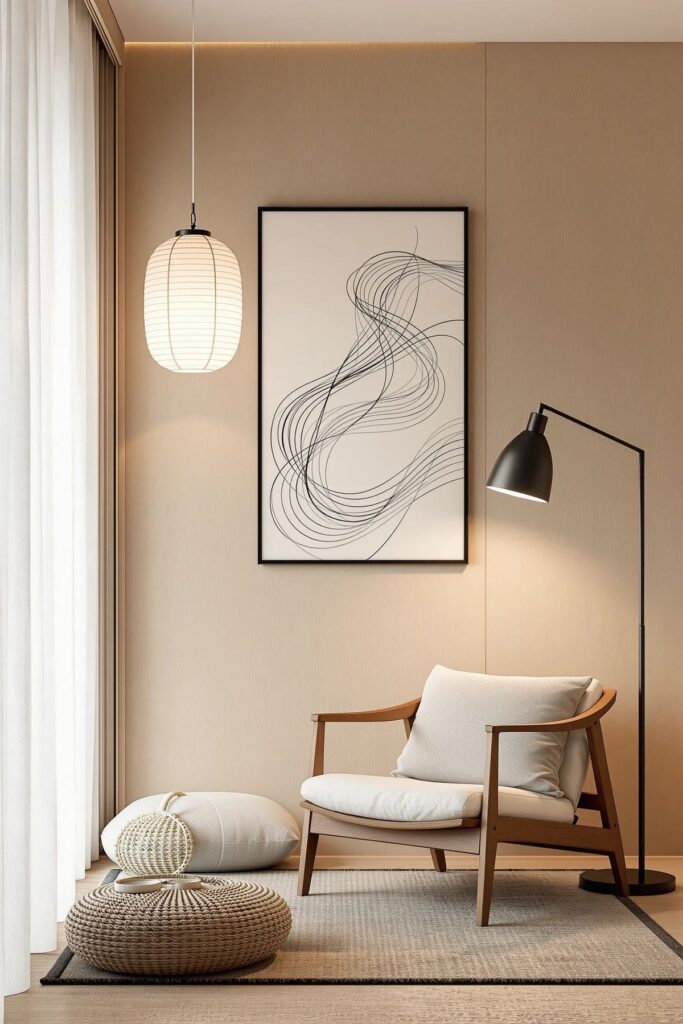
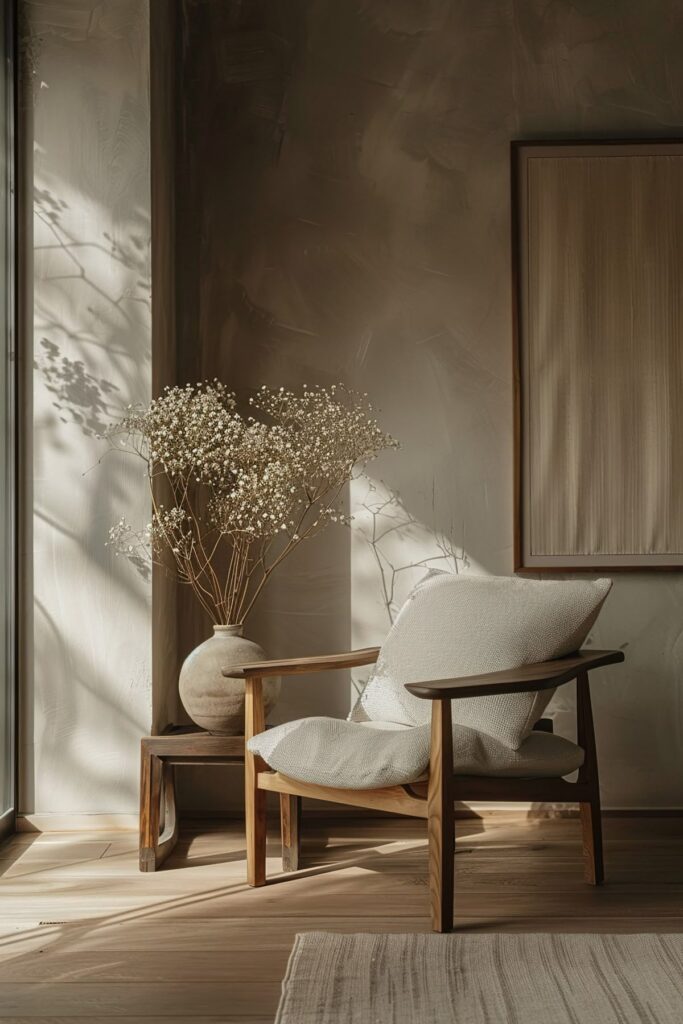
Ottomans & Poufs
These small, versatile pieces are the ultimate multitaskers for a casual living room.
- Function: Footrest, extra seating, impromptu side table, decorative accent.
- Casual Styles:
Knitted Poufs: Offer incredible texture and softness, often in neutral or muted tones. Woven Ottomans: Made from jute, rattan, or seagrass for a natural, earthy feel. Leather Poufs: Add a touch of global sophistication and wear beautifully over time. Upholstered Cube Ottomans: Can be easily tucked away or pulled out as needed.
- Tips: Cluster a few different-sized poufs together for an interesting arrangement. Use a tray on top of an upholstered ottoman to create a stable surface for drinks. They’re fantastic for adding an informal touch and can be easily moved around the room.
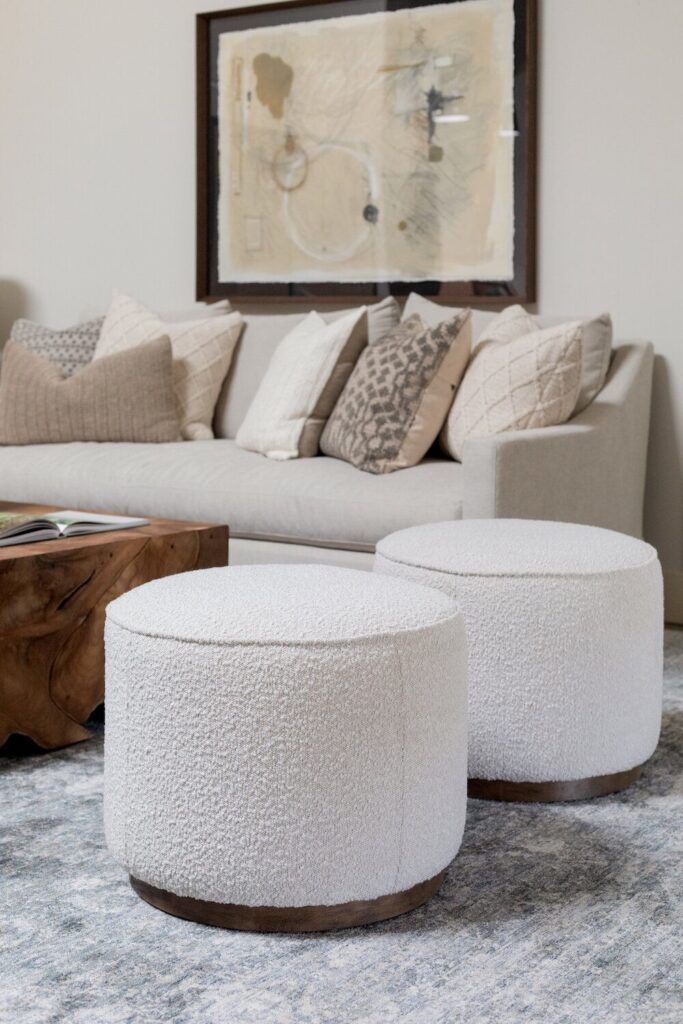
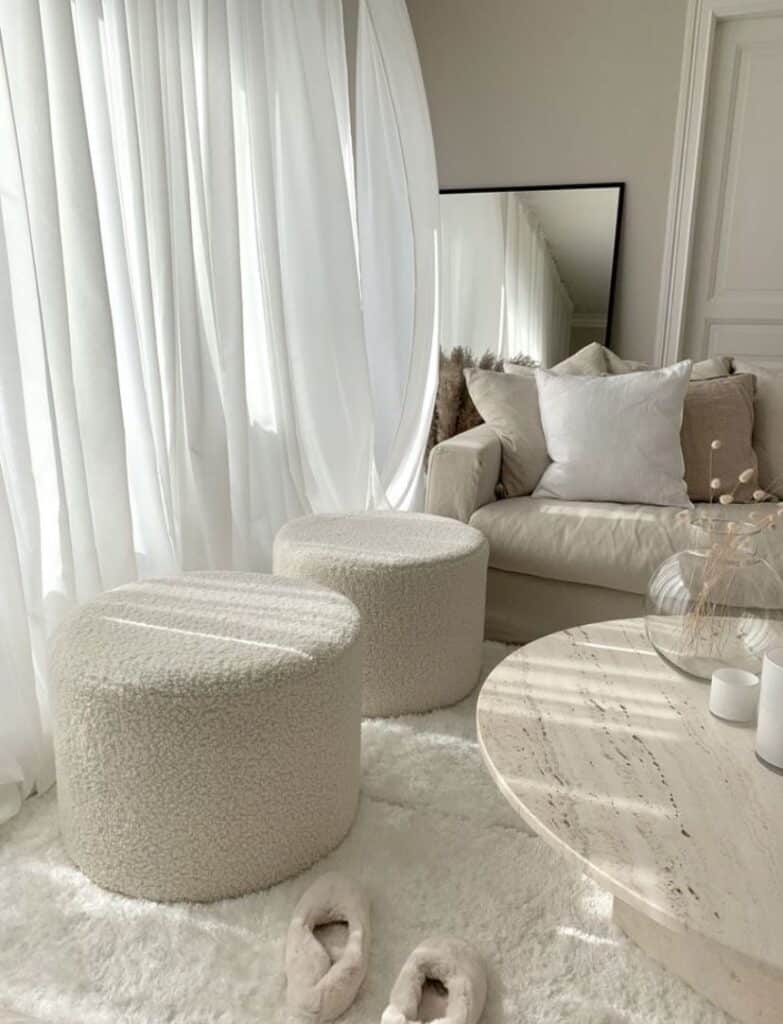
Console Tables
While often seen in entryways, a console table can be a brilliant accent behind a sofa or along an empty wall in a casual living room.
- Function: Surface for lamps, decor, books; hides wires behind a sofa; can act as a subtle room divider.
- Casual Styles: Narrow tables with open shelving, reclaimed wood consoles, simple metal frames, or those with woven baskets beneath for storage.
- Tips: Ensure the console height is no taller than the back of your sofa if placed behind it. Accessorize with two matching lamps, a few decorative objects, and perhaps some trailing plants.
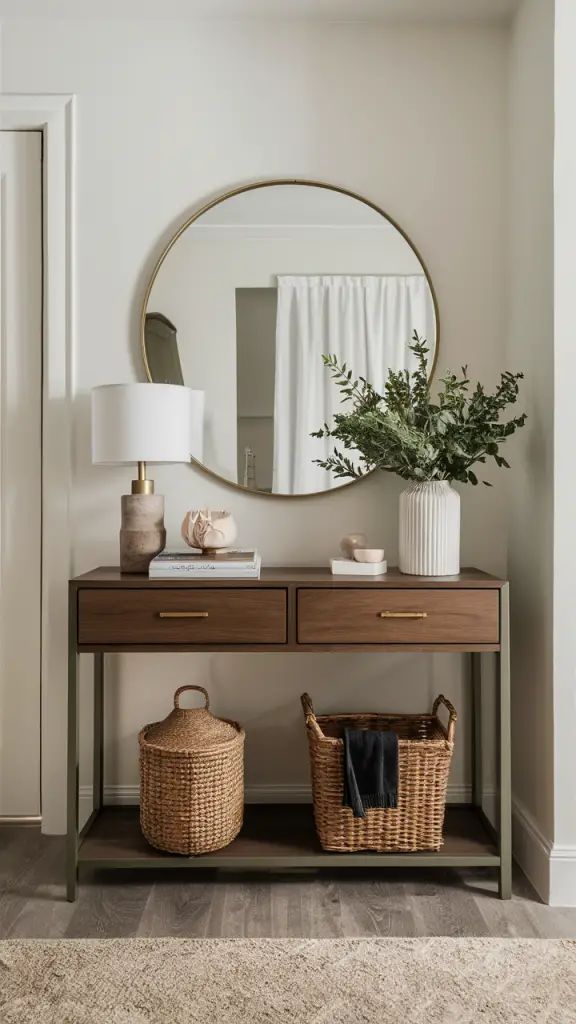
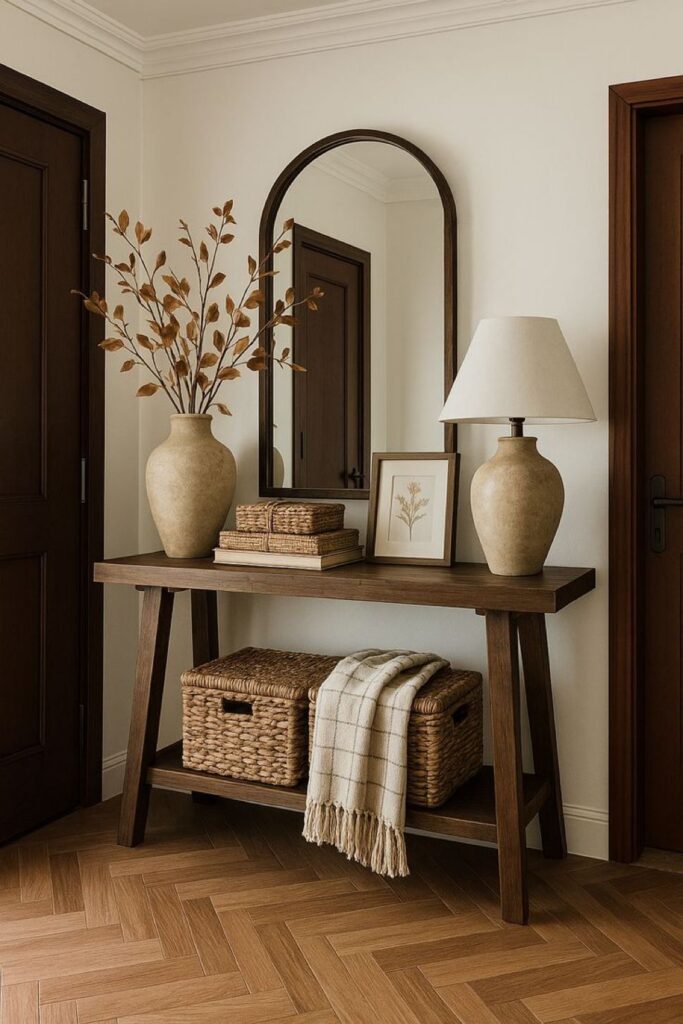
Storage Benches & Chests
Practicality meets style with these accent pieces, offering hidden storage for a clutter-free, casual look.
- Function: Seating, storage for blankets, pillows, board games, or seasonal decor.
- Casual Styles: Upholstered storage benches in linen or cotton, wooden chests with a distressed finish, woven trunk-style benches, or even vintage blanket chests.
- Tips: Place one under a window, at the foot of an armchair grouping, or against a wall. It’s perfect for keeping your living room tidy without sacrificing comfort or style.
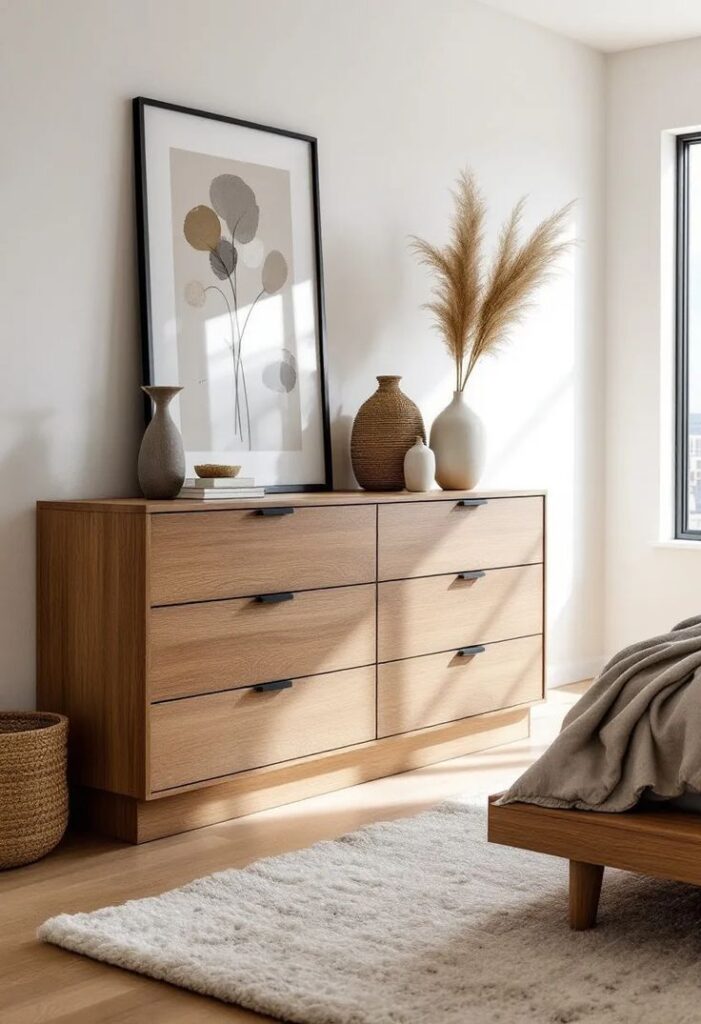
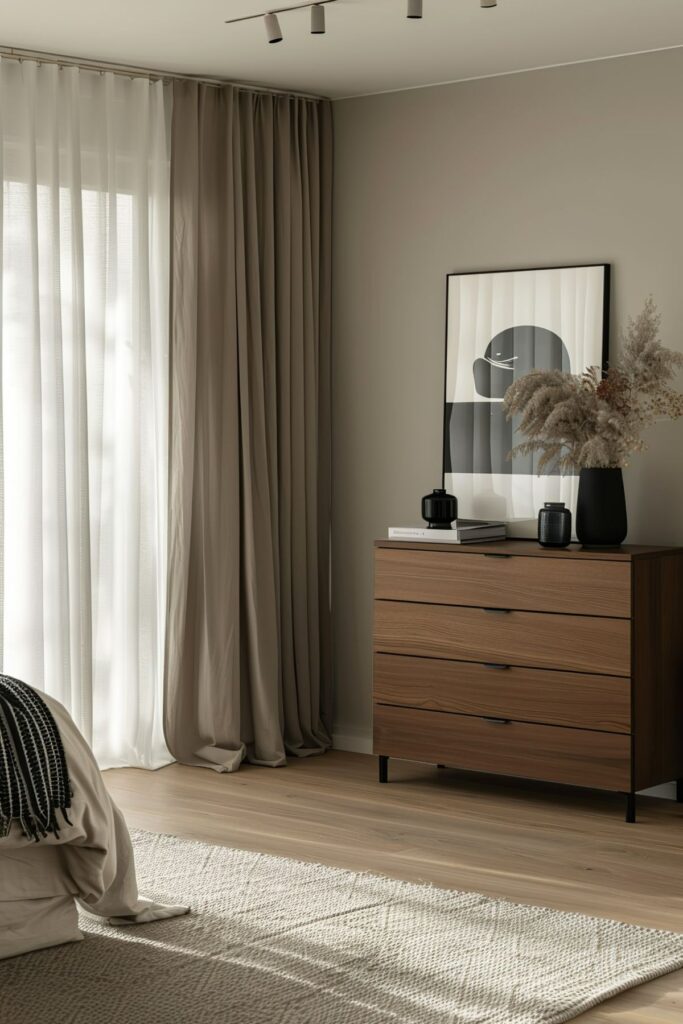
Bookcases & Shelving Units
These aren’t just for books. In a casual living room, open shelving invites curated displays that reflect your personality.
- Function: Storage, display space for decorative objects, books, plants, and art.
- Casual Styles: Open-back shelving units, ladders shelves, modular systems, or even floating shelves. Natural wood, matte black metal, or white finishes are popular.
- Tips: Mix books with decorative items, framed photos, and small plants. Don’t overcrowd the shelves; leave some breathing room for an airy, casual feel. For ideas on styling, think about how these can contribute to creating a cohesive look across your space.
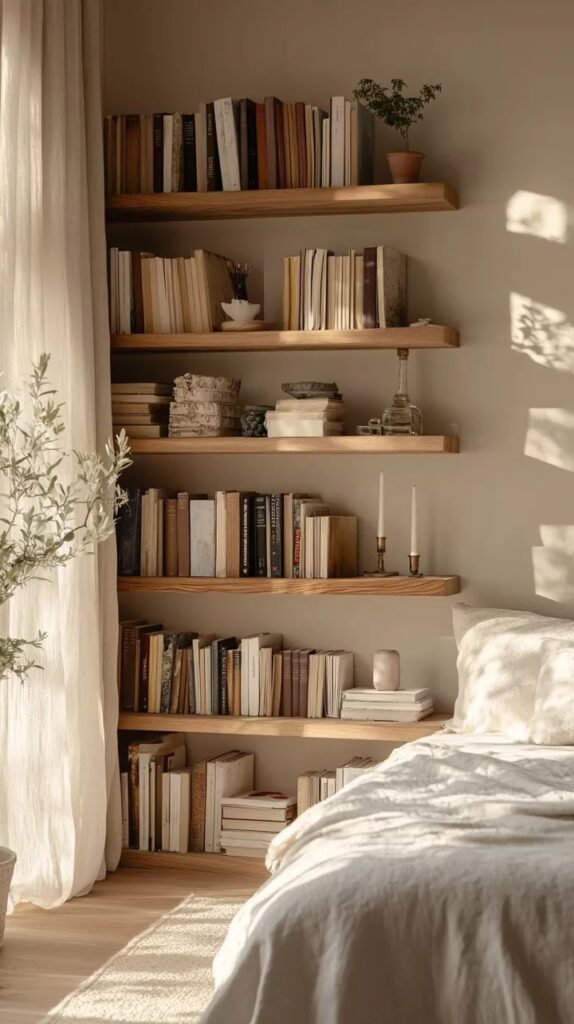
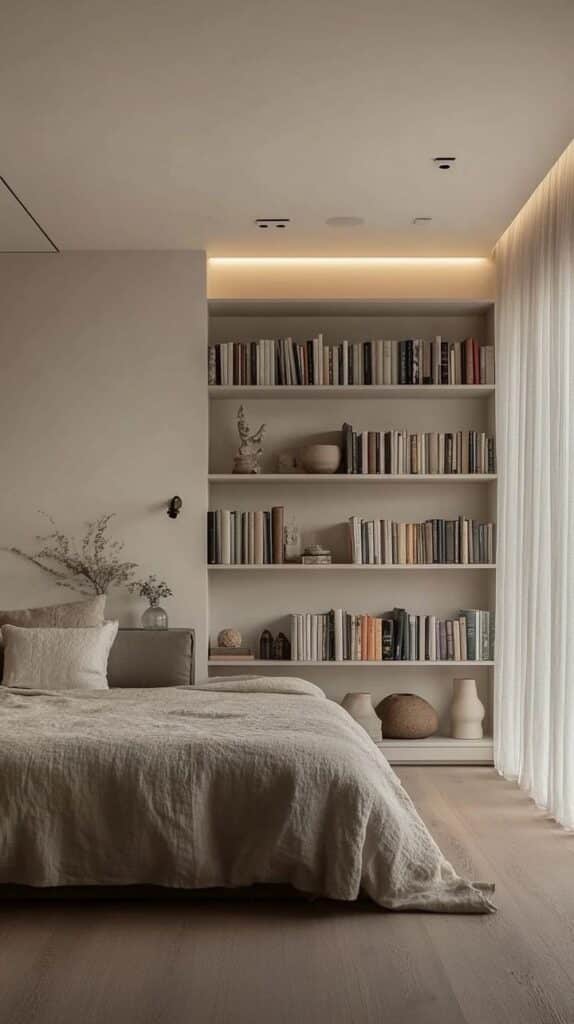
Decorative Screens & Room Dividers
For larger or open-concept spaces, a decorative screen can add a touch of casual elegance and subtle definition.
- Function: Create privacy, define zones, add a decorative backdrop.
- Casual Styles: Woven rattan screens, wooden screens with slatted designs, or fabric panels with simple, natural patterns.
- Tips: Use behind an accent chair to create a reading nook, or to visually separate the living room from an adjacent dining area.
Bar Carts
Even if you’re not a frequent entertainer, a stylish bar cart can be a charming and functional accent.
- Function: Serve drinks, display glassware, hold decorative bottles, or even act as a mobile side table.
- Casual Styles: Mid-century modern inspired carts with brass or chrome details, rustic wooden carts, or simple metal frame carts.
- Tips: Stock it with a few nice bottles, some unique glassware, and a small plant or a bowl of fresh fruit for a sophisticated yet relaxed look.
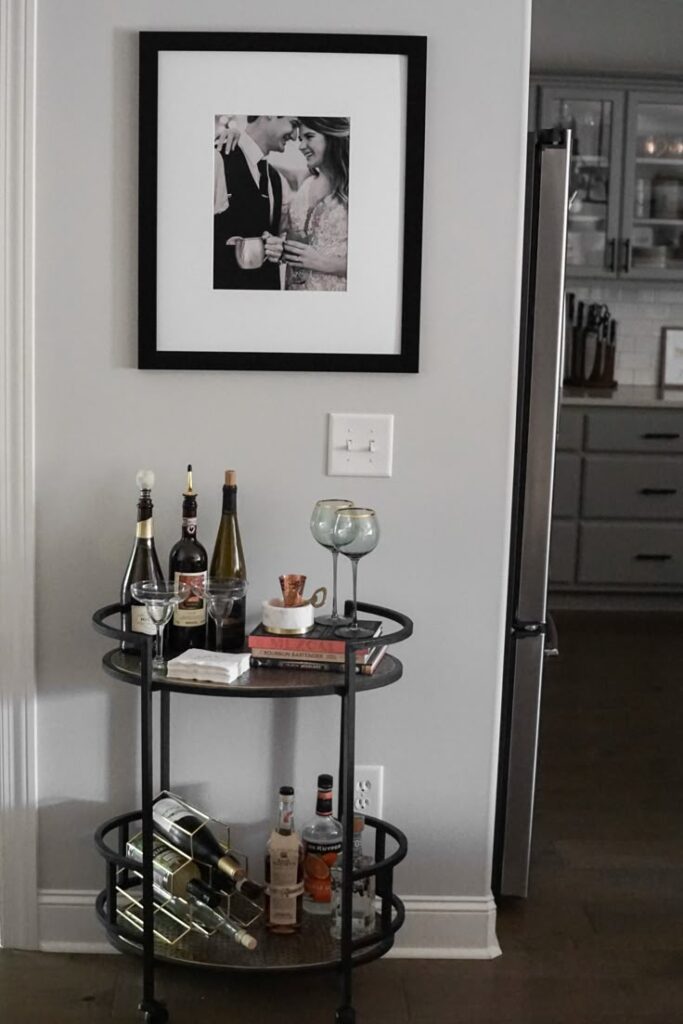
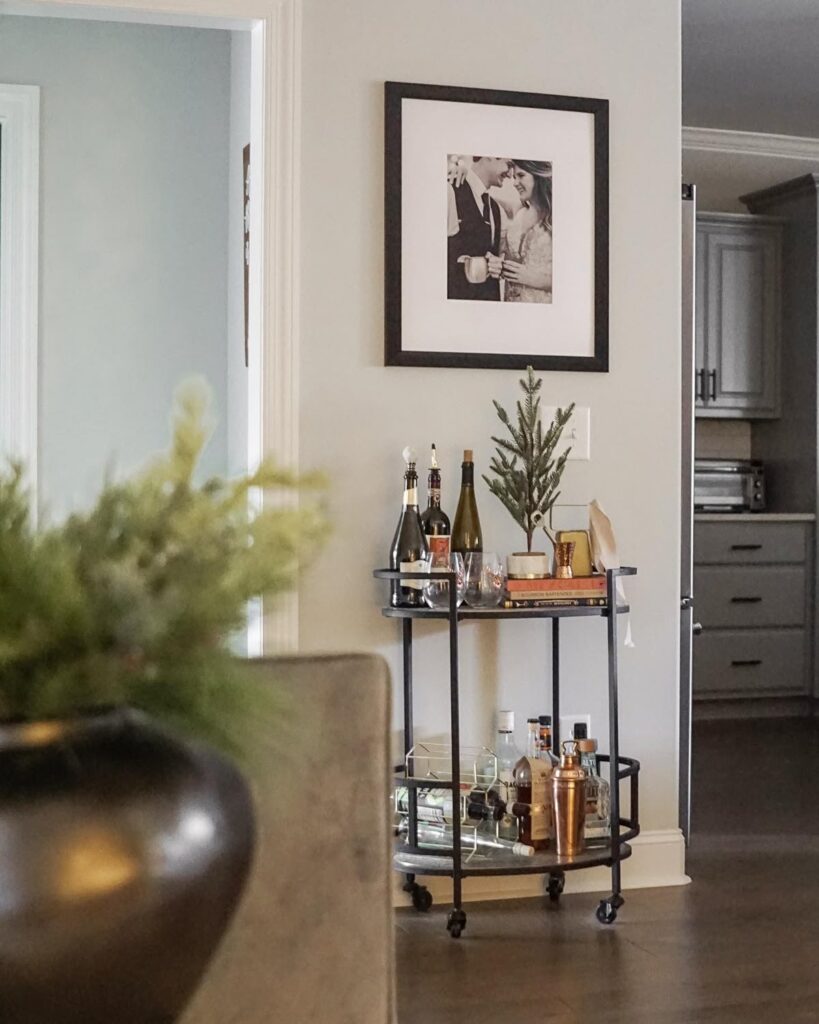
Floor Lamps & Table Lamps
Lighting isn’t just functional; it’s a powerful accent that sets the mood and highlights other pieces.
- Function: Provide ambient, task, and accent lighting; add sculptural interest.
- Casual Styles: Tripod floor lamps, arc lamps, ceramic or woven base table lamps, lamps with linen or natural fiber shades.
- Tips: Use warmer light temperatures (around 2700K) for a cozy, inviting glow. Place lamps strategically to illuminate reading areas or highlight artwork. A well-placed lamp can drastically change the feel of a room, adding warmth and depth.
Choosing the Right Casual Accent Pieces
Selecting accent furniture for a casual living room isn’t just about picking pieces you like; it’s about making thoughtful choices that contribute to the overall relaxed aesthetic.
Material Matters
The materials you choose play a huge role in defining the casual vibe.
- Natural Woods: Light oaks, bleached woods, or reclaimed timber bring warmth and an organic feel. Distressed finishes add character.
- Rattan, Wicker, Jute, Seagrass: These woven materials instantly introduce texture and a relaxed, airy quality, perfect for a bohemian or coastal casual look.
- Upholstered Fabrics: Linen, cotton, boucle, chenille, or performance velvets offer softness and comfort. Choose textured rather than overly smooth fabrics.
- Metals: Opt for brushed brass, matte black, or antique bronze for understated elegance. Avoid overly shiny or ornate metals.
- Ceramics & Stone: Garden stools, lamp bases, or decorative objects made from these materials add an earthy, handcrafted touch.
Color & Texture Palette
For a casual space, build on a foundation of neutral colors.
- Neutrals: Creams, whites, soft grays, and warm beiges create a calming backdrop.
- Earthy Tones: Incorporate olive green, terracotta, muted blues, and sandy browns for a grounded, natural feel.
- Pops of Color: If you want color, use it sparingly in accent pieces like throw pillows, a small rug, or a ceramic vase. Choose colors that feel inviting and not too loud.
- Texture is King: Layering textures is crucial for casual comfort. Combine smooth woods with chunky knits, soft linens with woven baskets, and matte metals with fluffy rugs. This creates visual depth and a tactile experience.
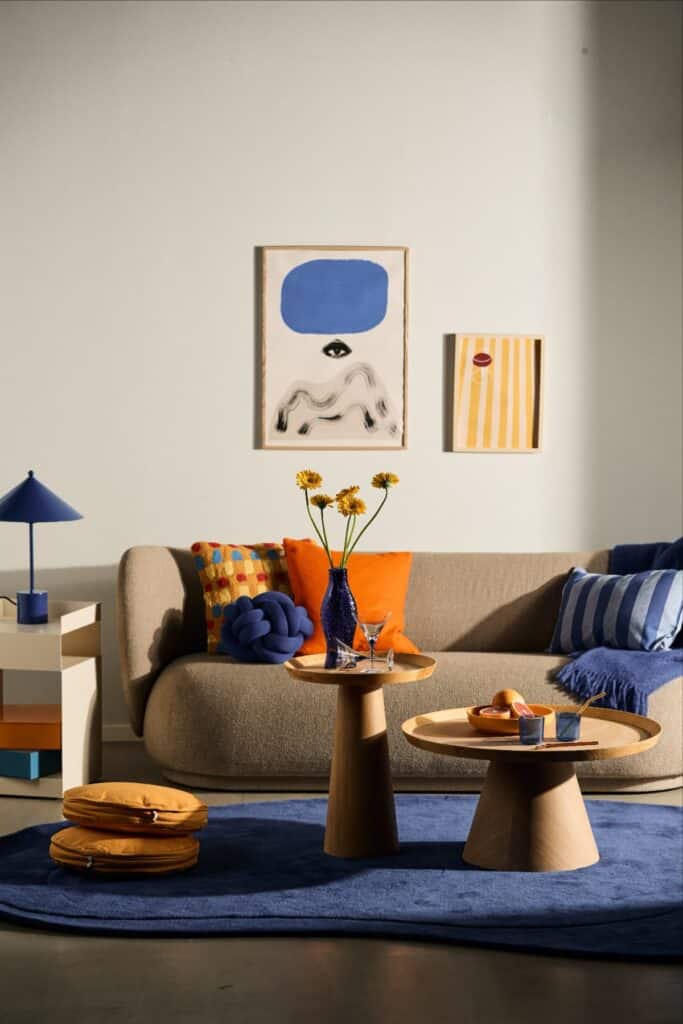
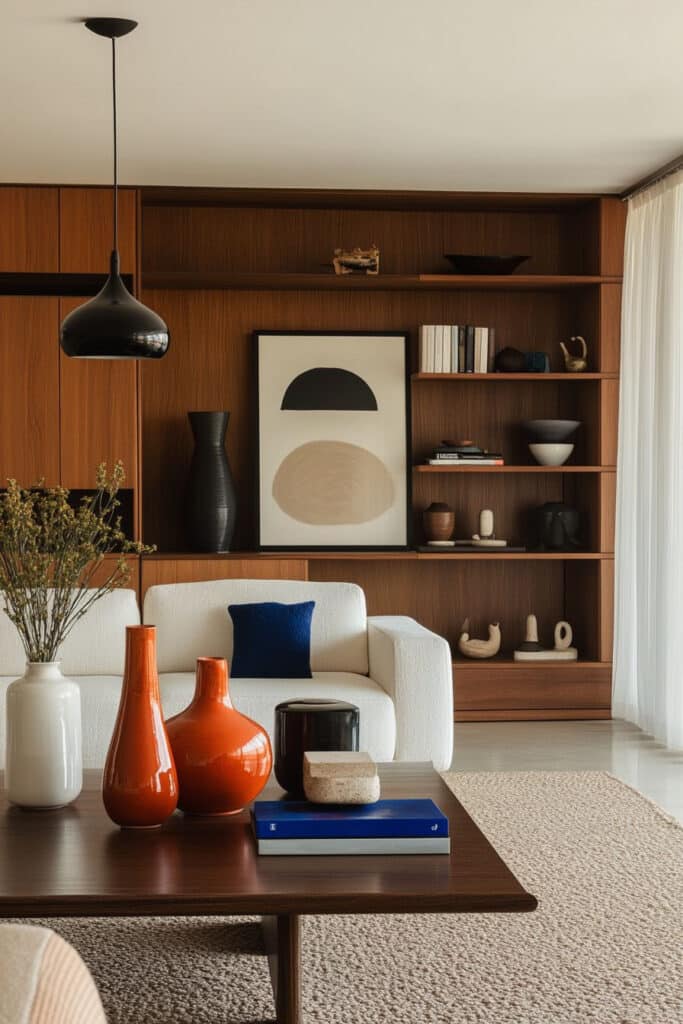
Scale & Proportion
Even in a casual setting, balance is key.
- Ensure your accent pieces are proportionate to your main furniture and the room’s size. A tiny side table will look lost next to a large sofa, and an oversized accent chair can overwhelm a small room.
- Use varying heights to create visual interest. For instance, a tall floor lamp next to a low side table.
- For tips on how to arrange furniture in smaller spaces, consider exploring Small Space Solutions: 10 Open Concept Home Interior Design Ideas.
Functionality First
Before you fall in love with a piece, ask yourself how it will be used.
- Does that beautiful accent chair actually provide comfortable seating?
- Is the coffee table stable enough for drinks and remotes?
- Does the storage bench offer enough space for what you need to hide away?
A casual living room is about easy living, so every piece should serve a practical purpose, even if it’s primarily decorative.
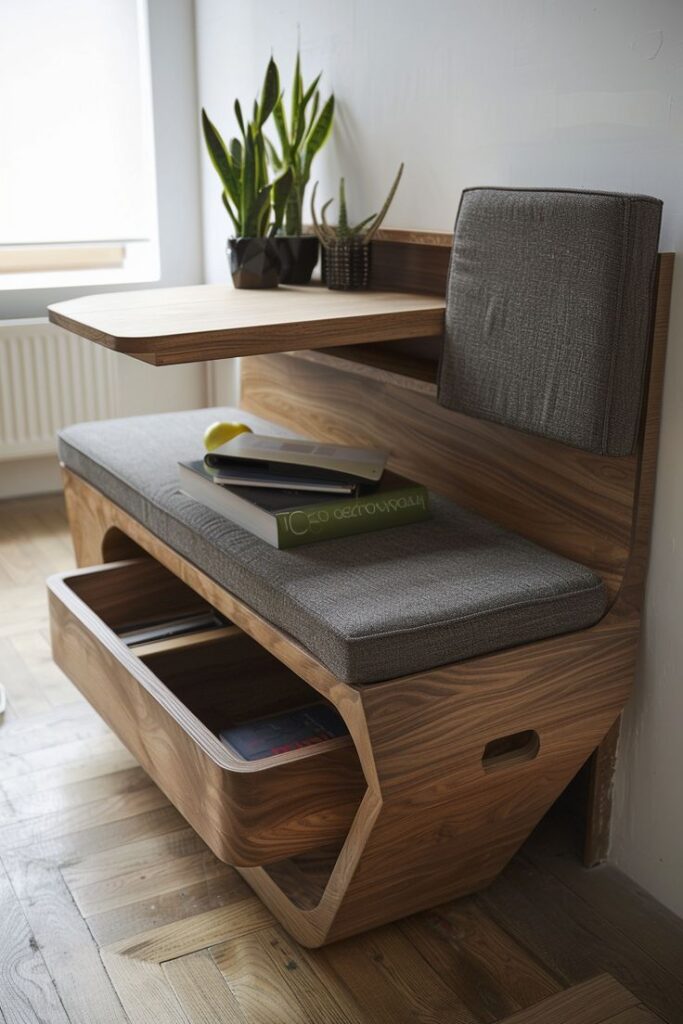
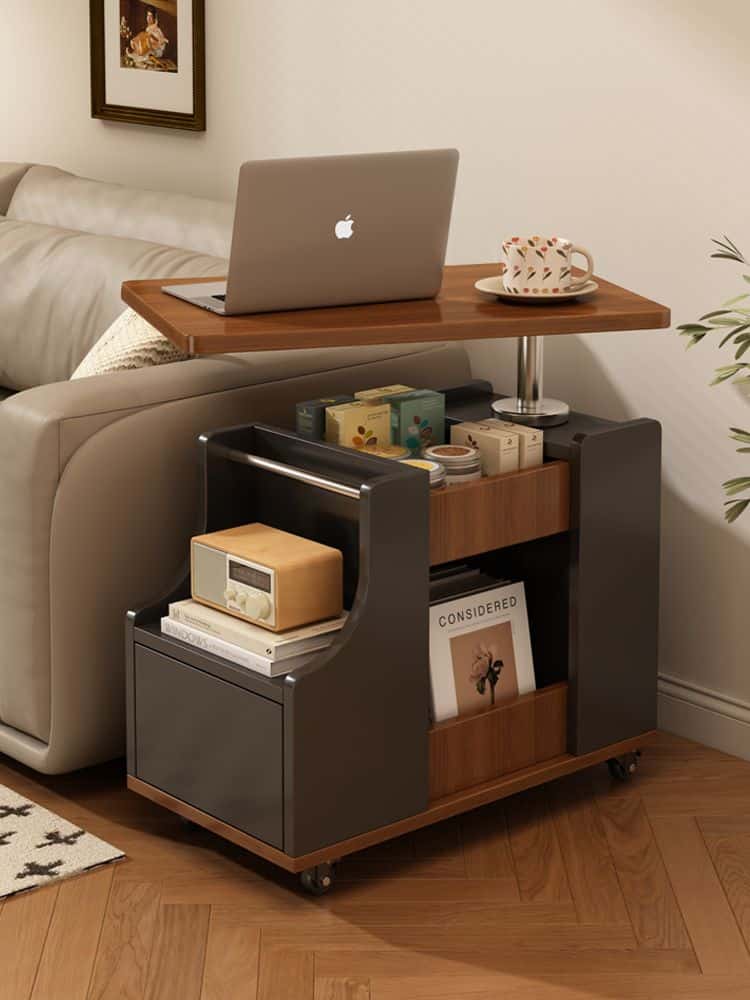
Reflect Your Personality
This is where “effortless style” truly comes into play. Your casual living room should feel like you. Don’t be afraid to mix different styles, incorporate sentimental items, or choose pieces that spark joy. The more authentic your choices, the more genuinely comfortable and stylish your living room will feel.
Styling Your Casual Accent Furniture for Maximum Impact
Once you have your accent pieces, the magic happens in how you arrange and style them. This is where you bring everything together to create that coveted effortlessly chic vibe.
Grouping & Arrangement
Think about creating vignettes and conversation zones.
- Conversation Areas: Arrange accent chairs opposite or at angles to your sofa, with a coffee table or a cluster of poufs in the middle.
- Reading Nooks: Pair an accent chair with a small side table and a task floor lamp. Add a cozy throw and a stack of books.
- Visual Balance: Distribute the visual weight of your furniture evenly. If you have a large sofa on one side, balance it with two accent chairs or a console table and a substantial lamp on the other.
Layering with Textiles
This is a casual living room’s secret weapon for warmth and softness.
- Throws: Drape a chunky knit, linen, or faux fur throw over the arm of your sofa or an accent chair.
- Pillows: Mix and match different textures (velvet, linen, knit), patterns (subtle geometrics, stripes, solids), and sizes on your sofa and accent chairs.
- Rugs: An area rug anchors the entire seating area, adding warmth, color, and another layer of texture. Choose natural fibers like wool, jute, or cotton for a casual feel.
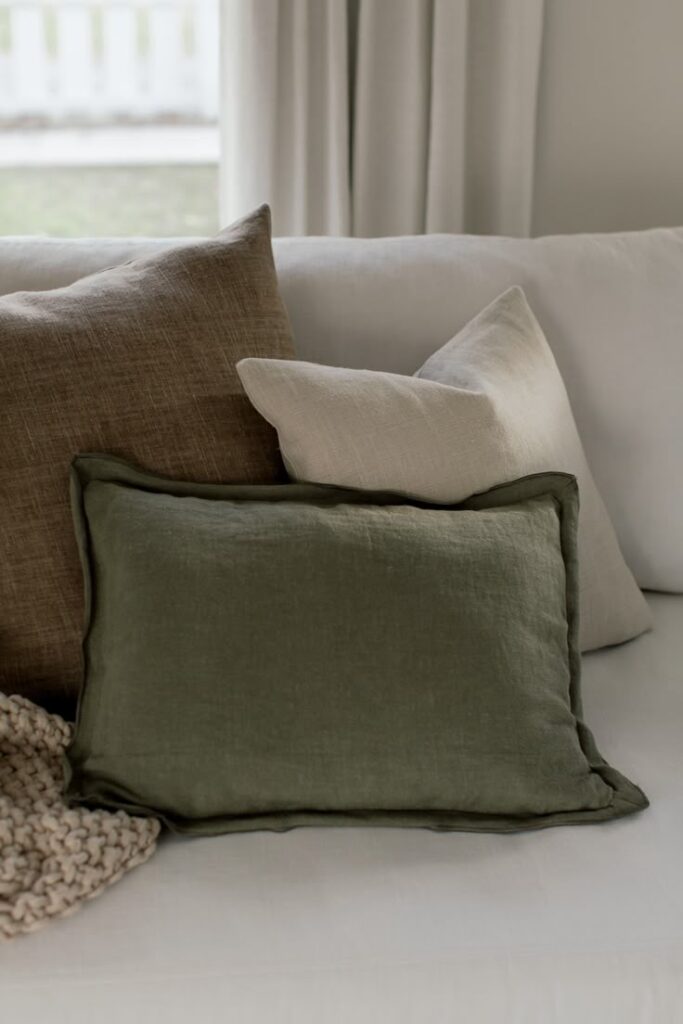
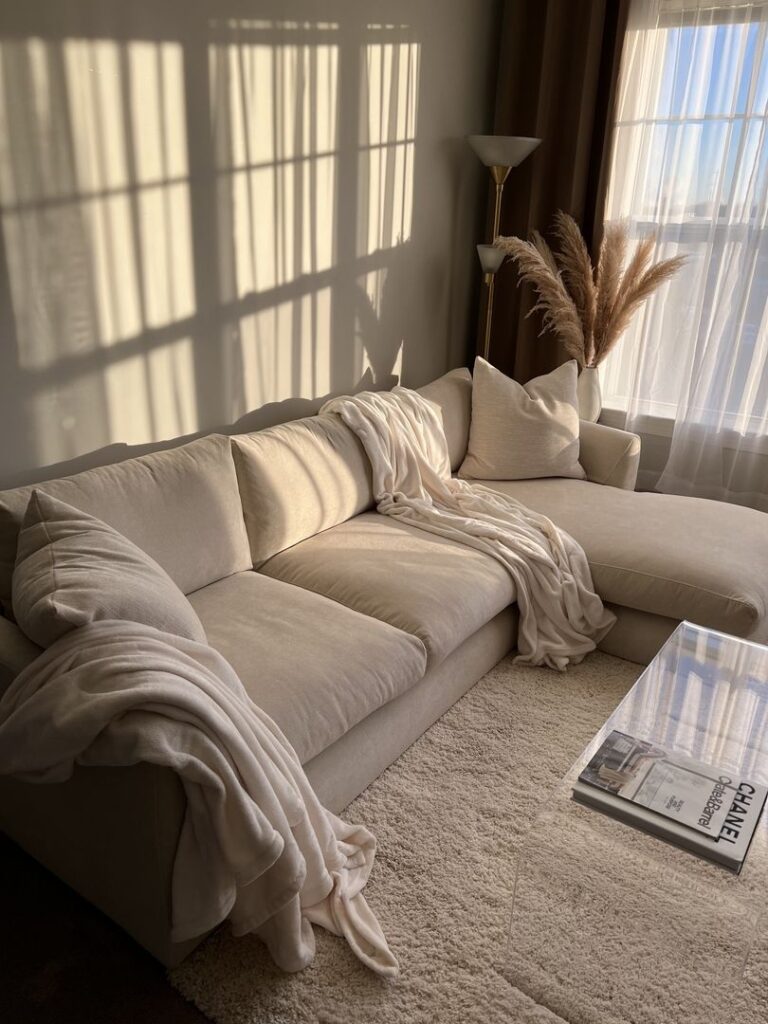
Accessorizing Smartly
For a casual look, less is often more. Focus on curated, meaningful accessories rather than clutter.
- Books: Stack a few interesting coffee table books on your coffee table or side tables.
- Plants: Introduce greenery with potted plants (ferns, snake plants, monsteras) or fresh flowers. They instantly bring life and freshness to a room.
- Decorative Objects: Choose a few unique vases, sculptural pieces, or personal mementos.
- Trays: Use decorative trays on coffee tables or ottomans to corral remotes, candles, or small trinkets, keeping things tidy.
The Power of Lighting
Beyond just turning on a light, consider how different types of lighting contribute to the mood.
- Ambient Lighting: General illumination, often from ceiling fixtures or soft floor lamps.
- Task Lighting: Focused light for activities like reading, provided by floor lamps or table lamps next to seating.
- Accent Lighting: Highlights specific features like artwork or shelving, often using smaller lamps or picture lights.
Layering these types of lighting allows you to adjust the ambiance to suit any mood or activity, enhancing the casual, inviting atmosphere.
Mixing Styles (The Eclectic Approach)
A truly casual living room rarely adheres to a single design style. Embracing eclecticism is key to achieving that “effortless” feel.
- Combine a modern sofa with a vintage accent chair.
- Pair a sleek metal side table with a rustic wooden coffee table.
- Mix natural textures like rattan with industrial elements like a matte black lamp.
The trick is to find common threads – a consistent color palette, similar material tones, or a unifying scale – to ensure the mix feels intentional rather than chaotic. If you’re interested in mastering this, read How to Mix Design Styles in Your Home.
Incorporating Greenery
Plants are an absolute must for a casual living room. They add life, color, and a sense of calm.
- Place larger potted plants in empty corners.
- Add smaller plants to side tables, shelves, and coffee tables.
- Hang trailing plants from shelving units.
The natural element of plants instantly enhances the relaxed, organic feel of a casual space.
Conclusion
Your living room is more than just a collection of furniture; it’s a reflection of your lifestyle, a sanctuary for relaxation, and a backdrop for connection. By thoughtfully choosing and styling living room accent furniture, you can transform it into a space that embodies effortless style and genuine comfort. It’s about creating an environment that feels welcoming and lived-in, where every piece contributes to a relaxed and authentic aesthetic.
Don’t be afraid to experiment with different textures, mix and match styles, and inject your personality into every corner. Embrace the beauty of natural materials, versatile pieces, and smart accessorizing. When you curate a living room with casual accent furniture, you’re not just decorating; you’re creating a haven where memories are made, laughter resonates, and comfort is always within reach. So go ahead, find those perfect pieces, arrange them with intention, and enjoy the beautiful, relaxed living room you’ve always dreamed of.
What does ‘casual’ mean in living room design?
In living room design, ‘casual’ means prioritizing comfort, livability, and a relaxed atmosphere with approachable furniture, soft textures, warm colors, and personal touches that create an inviting space.
Why are accent furniture pieces important in a living room?
Accent furniture adds personality, functionality, and visual interest to a living space, helping to break monotony, define zones, and bring in texture and color that reflect your style.
What are some popular casual living room accent furniture pieces?
Popular casual accent pieces include side tables, coffee tables, accent chairs, ottomans, console tables, storage benches, bookcases, room dividers, bar carts, and various types of lighting fixtures.
How do I choose the right materials and colors for casual accent furniture?
Choose natural woods, woven materials like rattan and jute, soft upholstered fabrics, and understated metals in neutral and earthy tones to create a relaxed and inviting vibe, layering textures for depth.
What tips can help me style my living room accent furniture effectively?
Create vignettes and conversation zones, layer textiles like throws and pillows, incorporate greenery, balance proportions, and select lighting that sets the mood, ensuring each piece enhances the overall relaxed aesthetic.
- 9shares
- Facebook0
- Pinterest9
- Twitter0
- Reddit0




